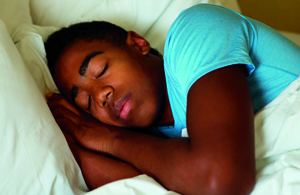Add sleep to your student athlete's training regimen
12/27/2021 by Luke Radel, M.D.

Life as a student athlete is busy. Full school days, practices, games, homework and social life make for a full schedule. Sleep often gets overlooked when scheduling the day, but this can come at a price.
A lack of quality sleep can negatively affect your student's academic and athletic performance. Your child is experiencing an important period of physical, mental and emotional maturation. Sleep is vital to optimize healthy growth and development during this time.
Here's how I respond to some of the common questions that student athletes and their parents ask me about sleep:
What the benefits of sleep?
Research has extensively described the benefits of sleep. In athletes, getting enough quality sleep has been demonstrated to improve mood, energy levels, and physical and cognitive performance; speed up recovery; improve immune function; and reduce likelihood of injury.
Adequate sleep has been shown to improve academic performance, which should be the top priority for student athletes. Getting enough quality sleep — in addition to practice, training and proper nutrition and hydration — is a vital part of achieving a student athlete's peak athletic performance. From an injury prevention standpoint, some studies have shown that even getting a single additional hour of sleep can greatly reduce injury risk.
Sleep is also important in regulating several physiologic functions, including immune function and energy storage. Sleep deprivation has been shown to decrease glycogen storage, which is one way the body stores energy for intense, prolonged physical activity.
How much sleep should an athlete get?
The amount of sleep each athlete needs varies, since some need more than others to perform at their peak. However, most high school athletes should get a minimum of eight to 10 hours of sleep per night, with younger athletes needing even more. In addition to getting adequate sleep, it's also important that sleep is high-quality.
I heard napping was bad for teenagers. Is this true?
Not all napping is bad. Rather, naps have been shown to be beneficial if done appropriately, since they can provide a physical and mental boost. A daytime nap can reduce sleep debt, and improve your energy, alertness and memory — and even reaction time and performance. Limit naps to about 30 minutes, and they shouldn't be done too late in the day, since prolonged naps or napping too late in the day can interfere with nighttime sleeping.
If athletes are excessively sleeping during the day, they're probably not getting adequate restorative nighttime sleep. Excessive daytime sleepiness also can be a symptom of depression in children, so alert your child's primary care provider if you're noticing a pattern of increased daytime sleepiness or other signs or symptoms of depression.
Is it OK if my athlete snores?
Snoring should not be brushed aside or ignored. Snoring can be a sign of a sleep disorder, such as obstructive sleep apnea. If your athlete consistently snores, you should discuss this with your primary care provider to see if an evaluation by a sleep medicine specialist would help.
What should I do if my athlete has trouble sleeping?
Sleep difficulties can occur for various reasons. Some student athletes have a difficult time falling asleep, while others may have trouble staying asleep or wake up frequently at night. Certain medical conditions can cause sleep issues, but most of these issues can be addressed by optimizing your sleep hygiene.
Improving sleep includes practices such as:
- Having a consistent bedtime routine, including going to bed and waking up at consistent times every day.
- Creating a relaxing and soothing environment, such as bathing before bed, playing soothing music or meditating.
- Making the room cool, dark and quiet. White noise or fans help some people sleep.
- Avoiding cellphones and other screen time at least one to two hours before bed. This artificial light can be stimulating and suppress your brain's melatonin production, which is an important hormone involved in your body's sleep-wake cycle.
- Avoiding heavy meals or exercise within two hours of bedtime, which can make it more difficult to fall asleep. Hunger also affects sleep, so try having a light snack before bedtime, if you're hungry.
- Avoiding caffeine late in the day, including coffee, soda, tea, energy drinks and chocolate.
If sleep problems persist despite these recommendations, consider discussing your student athlete's sleep with their primary care provider.
Luke Radel, M.D., is a physician in Primary Care in Rochester and Kasson's Division of Community Pediatric and Adolescent Medicine. He is board-certified in pediatrics and sports medicine. Dr. Radel volunteers as the team physician for the John Marshall High School football team. He was named a pediatric sports medicine "Top Doctor" in Minnesota Monthly in 2020 and 2021. He has experience treating youth, collegiate and professional athletes.
